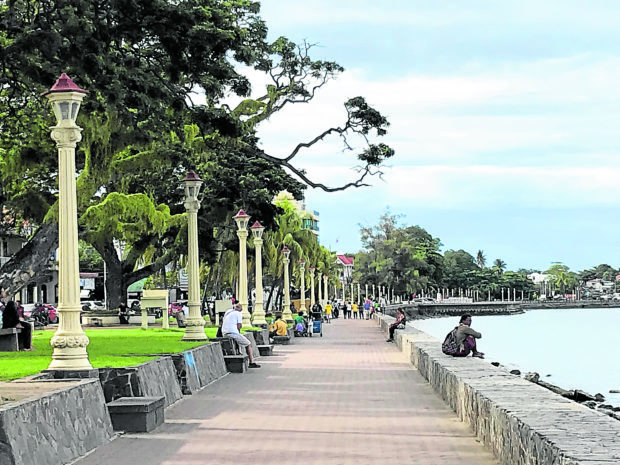Dumaguete’s P23-billion reclamation project faces wave of opposition

FAMED PROMENADE Rizal Boulevard, Dumaguete’s promenade, is famous among local and foreign tourists. —ALEX REY PAL
MANILA, Philippines — Scientists, environmentalists and youth groups in Dumaguete City have called on the local government to rescind its approval and endorsement of a 174-hectare reclamation project in the city, citing its devastating impact on the marine environment and the coastal communities relying on fisheries for food and livelihood.
The proposed P23-billion reclamation along Dumaguete’s shoreline is a partnership between the city government and construction company E.M. Cuerpo Inc. It seeks to develop the site as a “5G-ready” minicity, complete with shopping malls, condominiums, esplanades and other business establishments.
Despite being made public only last week, the city government is reportedly scheduled to sign the joint venture agreement with the private firm today, July 12.
National scientist and former secretary of natural resources Angel Alcala, along with the present and past presidents of Silliman University and local scientists, said in a joint statement that the project would “directly destroy [and] literally bury” the few remaining coral reef, seagrass and soft-sediment ecosystems in Dumaguete that supported small-scale fishers in the city.
Biodiversity
A recent study showed that more than 200 fish species thrive in one of the areas that would be directly affected by the reclamation. Local fishers depend on about 60 percent of these species for livelihood and subsistence.
Article continues after this advertisementThe massive reclamation would also directly and indirectly destroy the four legally-established marine protected areas (MPAs) covering 104 ha in Barangays Bantayan, Lo-oc, Mangnao, and Banilad, the statement read. This would have a great impact and further the decline of the area’s local biodiversity and delicate ecosystems that many communities in the city rely on for much of their daily needs, it added.
Article continues after this advertisement“If the project pushes through, Dumaguete City will renege on its commitment to do its part in marine conservation,” it said. “It will be a disgraceful act considering that the MPA movement in the Philippines, known throughout the world for its successes in the past 40 years, has its roots in Dumaguete City at Silliman University.”
Aside from Alcala, the statement was signed by Silliman University president Dr. Betty McCann and former president Ben Malayang III, as well as scientists Hilconida Calumpong, Rene Abesamis, Enrique Oracion, Janet Estacion and Robert Guinoo.
The scientists also questioned the lack of transparency surrounding the project, particularly on its costs and revenues.
Dumaguete City Mayor Felipe Remollo should also disclose the history and track record of the private developer, they said in the statement.
“The mayor and the members of the council should publicly disclose their individual and collective reasons why this haste in pushing this huge project knowing that elections are to be held next year and they might not be in office by then,” they pointed out.
Youth’s appeal
In a separate petition, Negros youth groups called for an end to all reclamation and boulevard extension projects in the city, urging the government to instead focus on making Dumaguete sustainable, climate-resilient and more responsive to the inputs and needs of its residents.
The online petition, spearheaded by Kabataan Para sa Karapatan-Negros Oriental, Mangrove Matters PH and Association of Young Environmental Journalists-Dumaguete Chapter, among others, gathered nearly 4,400 signatures as of Sunday.
Remollo decided to start the reclamation project, which he referred to as a “boulevard rehabilitation” program, in June 2019, saying it was needed to protect the buildings and communities located along the city’s shoreline.
Secretary Roy Cimatu of the Department of Environment and Natural Resources gave an “area clearance” permit for the project on Dec. 16, 2019, which was valid for five years.
Groups opposing the project had criticized the lack of prior consultation, saying such undertaking would pave the way for the privatization of public spaces and have devastating environmental and social implications.
They argued that the city intended to displace the urban poor in coastal communities with its project “in the interest of profit over the interest of the people.”